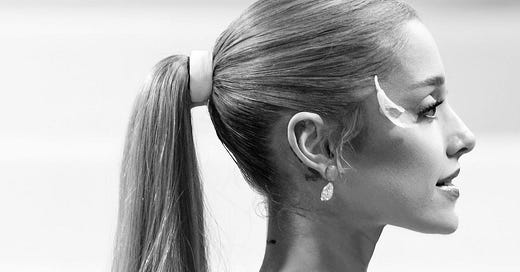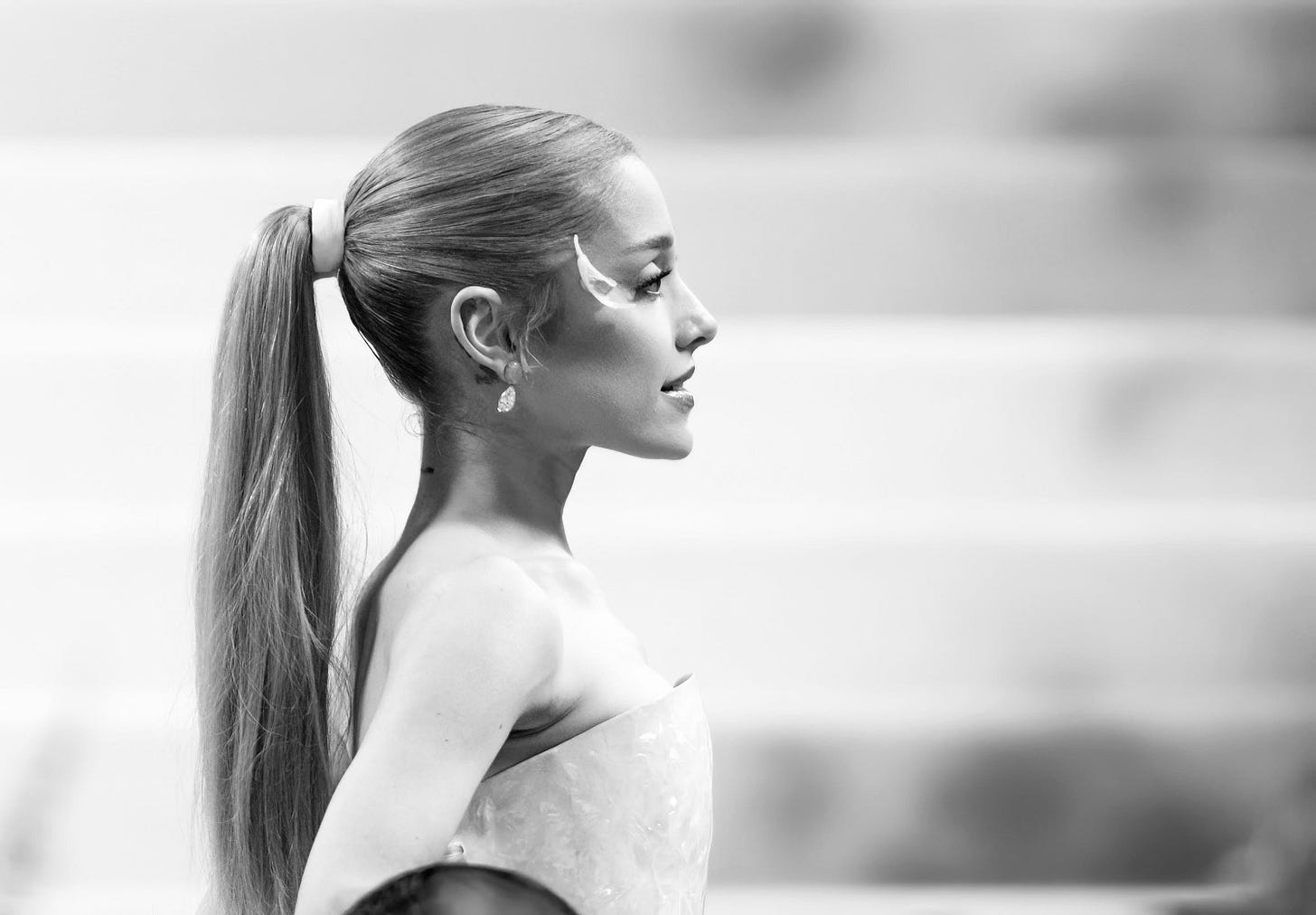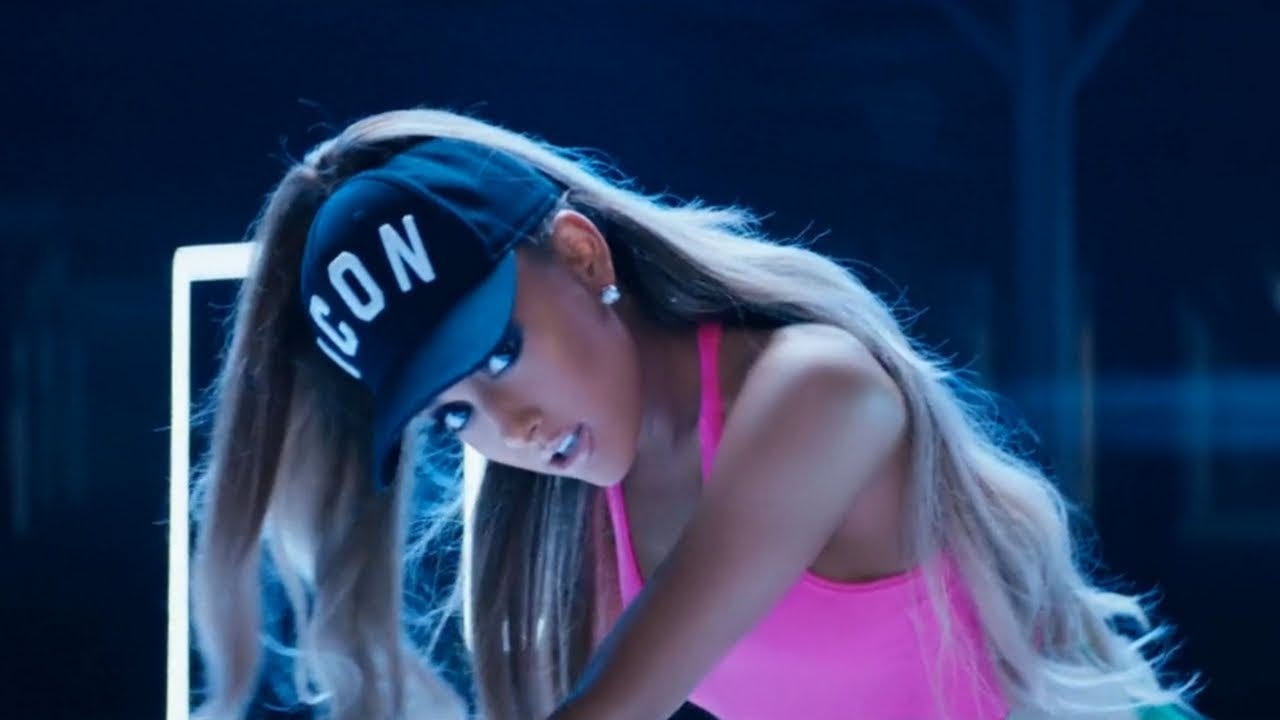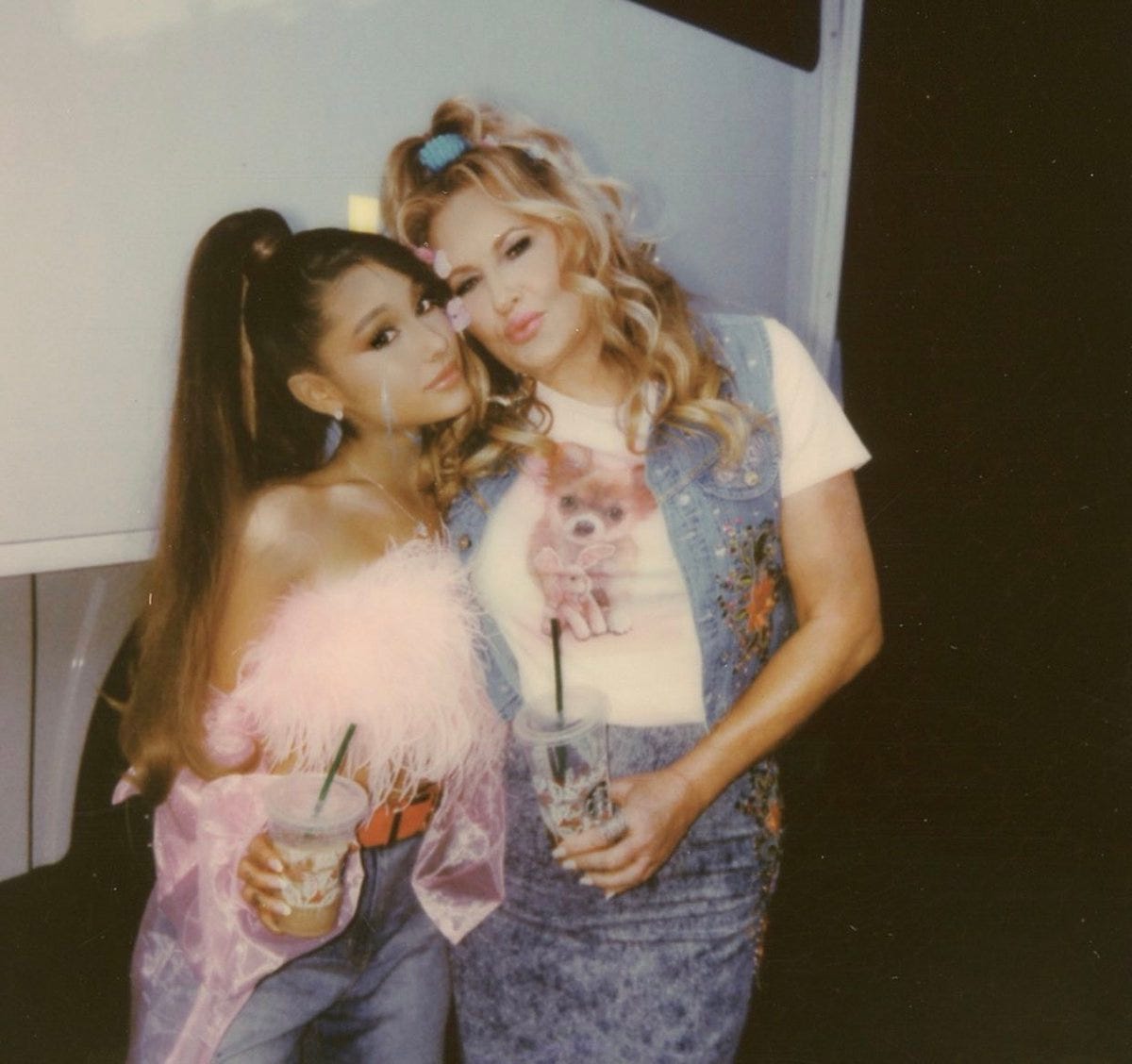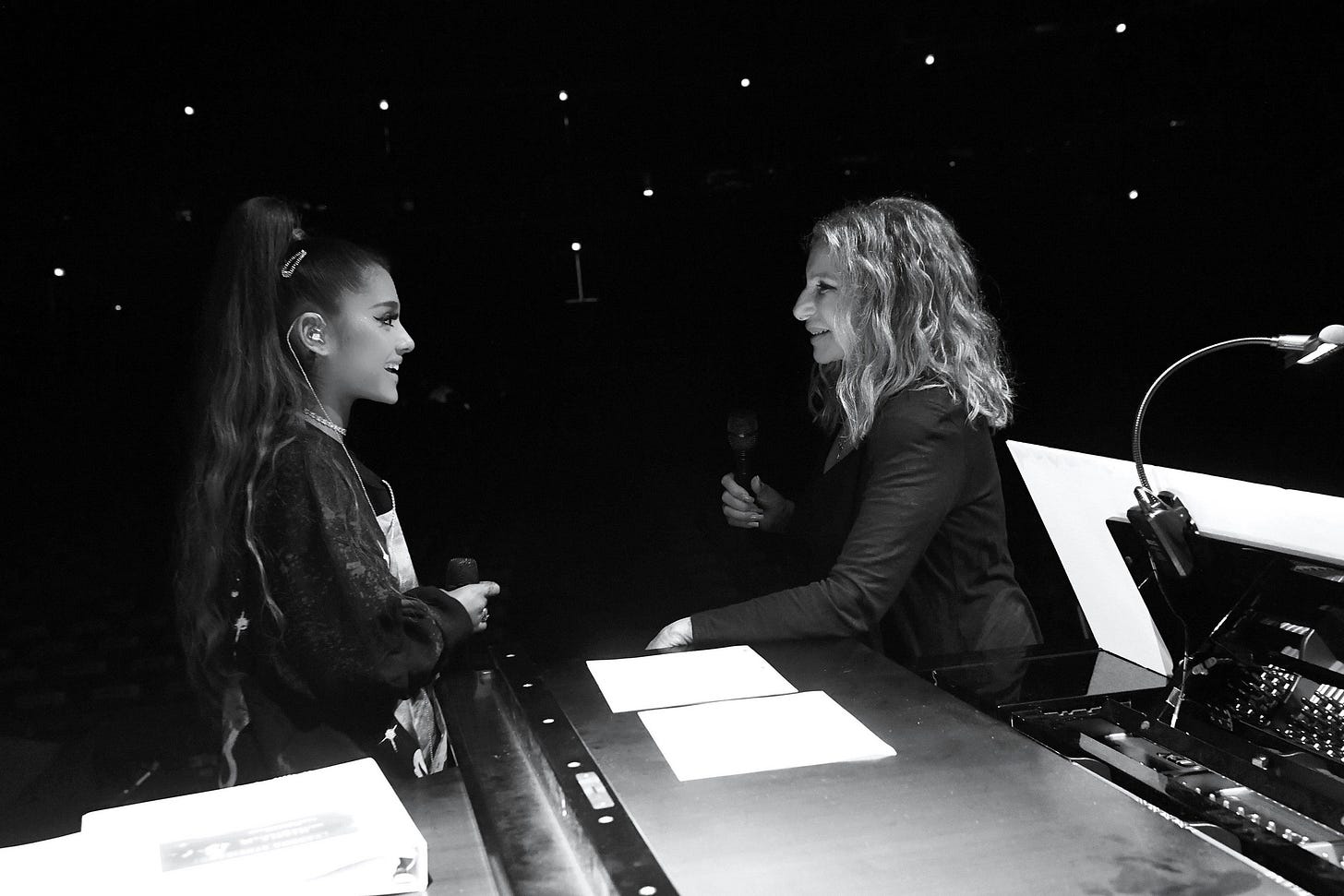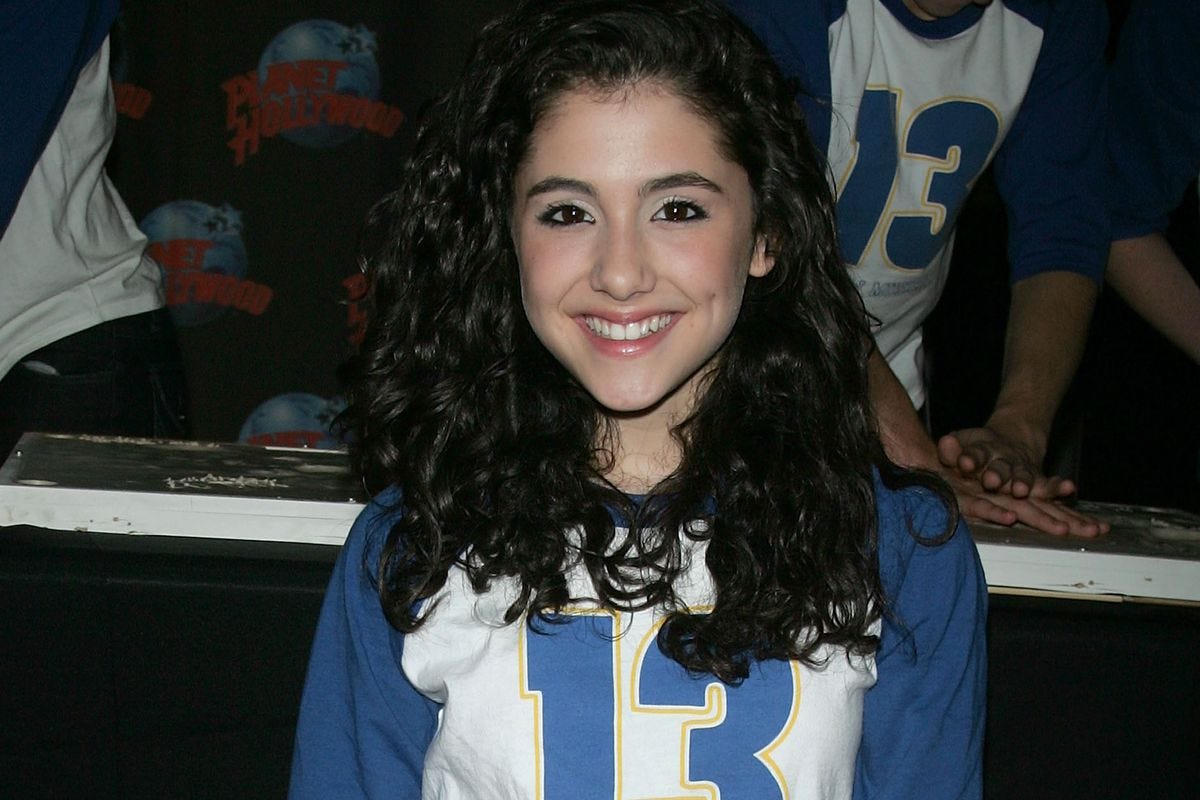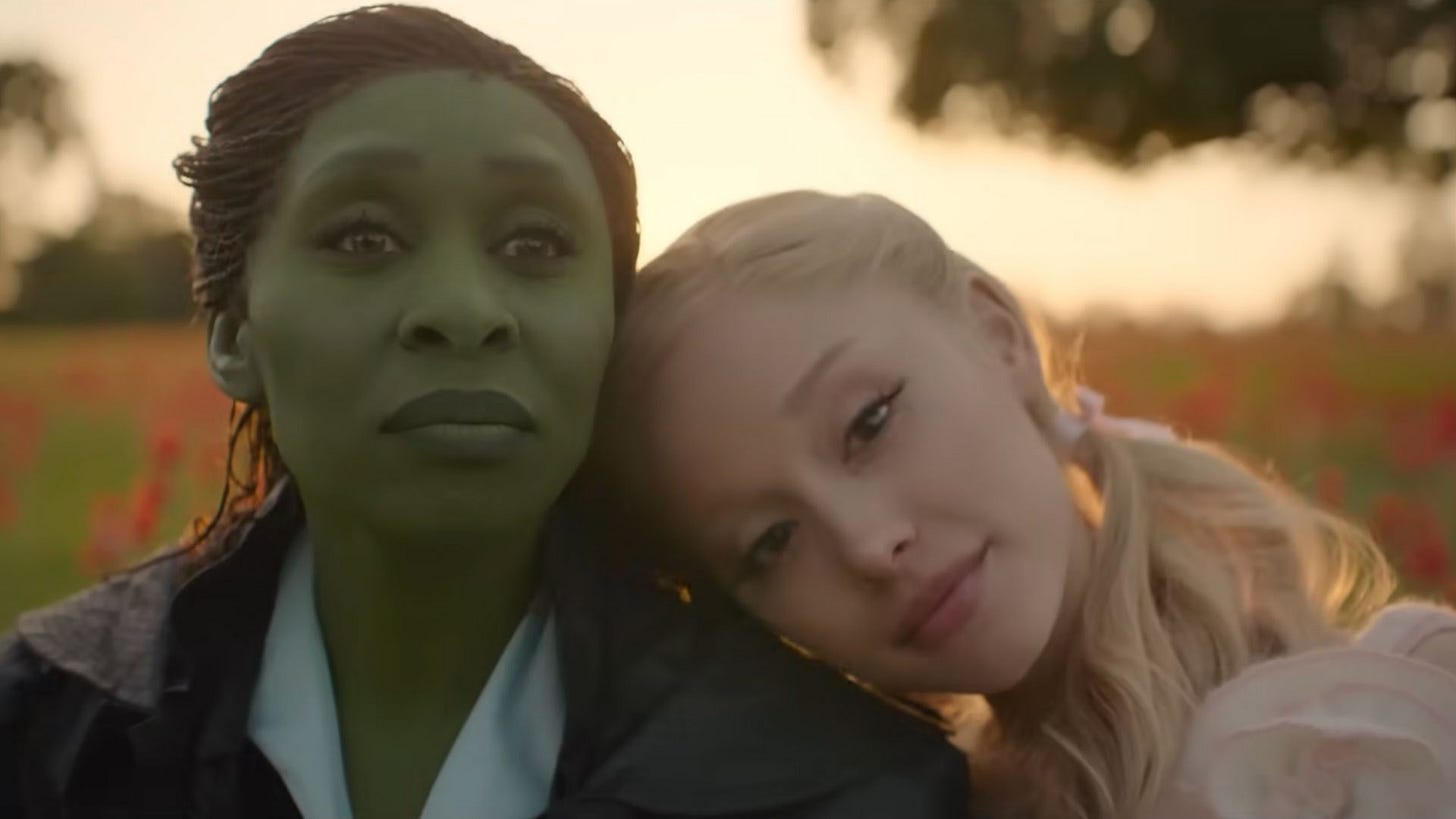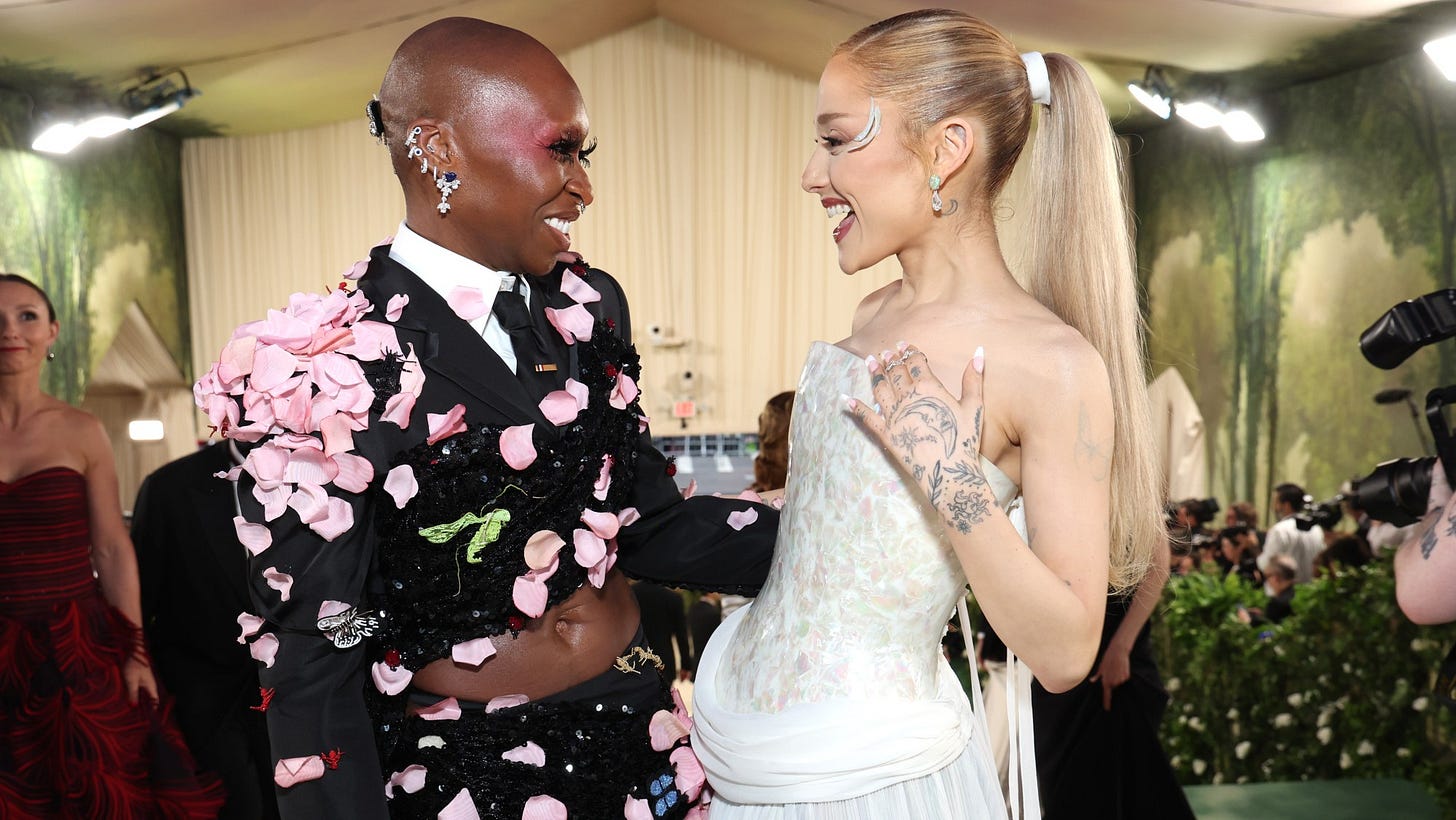All The Things: A Years-In-The-Making Conversation With Ariana Grande
We were having a gab-off.
I recently watched the fantastic Hulu documentary Brats (which I reviewed here). The doc centers around 1980s films starring the "Brat Pack" and their profound impact on the young stars' lives as a result of a 1985 New York Magazine article that effectively dismantled their career trajectories with its venom and vitriol toward the group. “They thought I was their friend,” the author of the piece, David Blum, said in an interview at the time. “Well, the honest truth is: ‘We’re not friends and I never said that we were.’”
He went on to apologize — not for the contents of his story, but for the fact that his subjects, namely Emilio Estevez (intended to be the sole subject of the piece), were operating under a different set of ideas about what the relationship between a journalist and a subject is. (“In truth, I still don’t understand why some Brat Packers feel so victimized,” Blum doubled down in Vulture just last month.)
I watched the documentary a week before my interview with Ariana Grande was set to go live, and immediately did what she and I often do when we’re engrossed by a piece of media and left her a lengthy voice memo word vomit with my thoughts. It got me thinking about our relationship, Ari and I, in comparison to the one between Blum and the Brat Packers. And it got me thinking more broadly about “gotcha” journalism and why celebrities don’t often hold any ownership over their stories.
Barbara Walters, my idol, would interview everyone: Barbra Streisand, Fidel Castro, John Wayne, Anwar Sadat, Katherine Hepburn, Muammar Gaddafi and Lady Gaga, all with the intention of seeking answers, finding truths, uncovering unturned stones. Presidents and war criminals and pop stars in this domain were equals. And it was that dignity granted to all subjects that could make an interview with Kate Gosselin feel as consequential as one with Richard Nixon. But it was part of a larger ecosystem that stripped entertainers of the ability to tell their story on their terms. From Walters’s 2014 interview with Taylor Swift: “You don’t drink, you don’t smoke, you don’t get into trouble — at least nothing that I’ve heard of. Tell me something bad about Taylor Swift.”
It was so much the norm, part of the publicity machine, that few questioned why. Folks like Walters and her many disciples had the platform, so it made sense why famous folks flocked to them despite a lack of assurance around how they might be framed. This was the price of fame. Over time, social media came around and tipped the scales. That, and some entertainers became powerful enough to avoid press altogether, and in doing so, were able to actually build intrigue and lore by withholding. This to say, entertainment journalism has evolved rapidly due to shifting power structures and more willingness to unpack misogyny and the ways the media depicts and often demoralizes young, famous women.
Why do I mention all this? Ariana Grande doesn’t do many interviews. I asked her about this: Do you like being interviewed? “It depends,” she replied.
“When I was young, I established this relationship in my head with press and interviews that felt unsafe. There were all these stories coming out of nowhere that were completely false and were the most impossible thing to acclimate to and to understand what it had to do with music and singing at 19 years-old. Interviews just kind of freaked me out for a while.”
It makes sense, especially when you consider the microscope she’s under due to the scale of her fame combined with her ascent being practically in tandem with that of stan culture.
This interview is not between a journalist and a subject. I think you’ll pick up on that rather quickly. It’s a conversation between two friends. I hope you enjoy!
Click here to listen to this interview in its original form on SHUT UP EVAN: THE PODCAST.
Ariana: Hi! I miss you!
Evan: I miss YOU! Let's start with a pressing matter: You’re doing a Sex and the City rewatch right now. Are there characters that stick with you?
I love Miranda. I think pieces of them exist within all of us, in certain ways. I think Miranda's brilliant and such a lovely friend and good communicator, but I don't think I actually am a Miranda. I swim in the waters of Carrie and Charlotte.
But I think Ari the pop star gives Samantha. Like, Side to Side? Hello!
I see that! And I have so much love for Carrie as well.
“imperfect for you” could be a Carrie anthem of sorts.
I really see that!
So you had this period of time during the making of Wicked where you were kind of in the cocoon of the production, and then you have this idea to get into the studio and start recording. How did these different creative endeavors coalesce in your life?
Without the experience of making Wicked and everything that I learned from that, I don't think I would have been able to come back to music the way that I did. I thought it was going to be just a couple of sessions with [my longtime collaborator Max Martin] for fun just to see what happened, and then that sort of became an album organically.
Talk to me about what a studio session is like.
Sometimes we’ll come in and go through beats, or we’ll just listen to tracks that inspire us. I’ll record melody passes. Sometimes we'll sit at the piano and find chords that move us, or sometimes we'll text weeks before we meet up and I'll say: “I have this concept” or “I have this melody, I don't know what it is” or Max will say: “I have this chord progression that might feel right for this.” It really just depends on the day.
There are so many roads you can travel down. How do you decide the path?
I feel like that's always different. Back in the day, we used to spend a lot of time on one thing, but this time around, with eternal sunshine, I feel like it was such an organic, natural, free-flowing experience. If it wasn't just pouring out and the melodies didn't feel like the ones that should be on the song and the words didn't come right away, we would switch to a different idea. Sometimes we'd come back and it would be there later, or sometimes we just left it behind.
I remember the first time I heard the beat coming in at the beginning of “yes, and?” and I was just like “Oh, fuck.”
[Laughs] It was the most misleading first single, but from a storytelling perspective, it invited you in and set the tone and intention. It was the only option.
This is an incredibly personal album, and yet there's a lot of innuendo and implication. How do you decide how much of yourself to offer up for public consumption?
It's a tricky thing to navigate because I do want to express my feelings about my experiences, but I also want to protect the details of my life. It took a lot of combing through different versions of different songs and tweaking minor things here and there to be more protective. It's so interesting to see everyone’s interpretations of this music and I think that's a beautiful thing because I know what I wrote the songs about and I know what they helped me heal but it's still protected, and people are now using these songs to heal themselves and their own experiences. What I’ve discovered is sometimes, if you address something, you actually expose more of your real life. Protecting that peace is far more important than getting understanding and approval. Letting people in in that way is destructive, but maybe instead letting people in through art is cathartic and necessary to live.
That reminds me of a lyric from “yes, and”: “Your energy is yours and mine is mine.”
From therapy to the booth!
Might there be a deluxe version of eternal sunshine in the works?
I'm not a very “more is more” person usually, and I thought that this album was kind of perfect as it was. But with time, I've been inspired to write more songs and inclined to do this deluxe version. I think usually the intention behind a deluxe would be to push more singles or to have more chart play. My intention feels very anti-formulaic. I’m really tempted to push the creative button on this storytelling. I'm very happy with the life that the singles from this album have had; I'm not chasing after more of that. It's just an idea that has now become something that I can’t not do.
Is there anything specific that you can tell me about these songs?
I think the final song on it is one of my favorite songs I've ever written, and I think you in particular will love that song.
What are you thinking in terms of the timeline for this deluxe version?
I'm not sure on the timing yet because I want to let it live in this current, perfect state for a little while longer and take my time to execute my vision to make sure it's worth the wait.
People are clamoring for an eternal sunshine tour. Is touring something that you're thinking about with this album?
I still want to. I think it would be a really lovely idea to trickle in some shows between the two Wicked films. I think there's a version of that that exists, but it's definitely not going to be a tour in the way that I used to tour. It would be a mini little sampling of shows. It’s something my team and I are working on.
What you’re saying reminds me of something from Celine Dion’s recent documentary, I Am: Celine Dion. She says:
“If you want to go fast, go alone. If you want to go far, go together.”
I feel like it's easy to go fast and to try and do everything to supposedly appease people, but maybe at the cost of one's health. I think what you're speaking to is this idea of wanting to go far and needing to do that in a way that protects your peace and protects your health.
I hope so because I know that it's not what I used to be able to give my fans, but I want to give them as much of me as I can in a way that’s comfortable and healthy, so I'm working on it. And that Celine quote — I just love her so much. She's just the prime example: [Singing] is her life line. She’s had such a beautiful relationship to it, but it takes such hard work to sustain yourself as a vocalist. Your voice is inside your body; it's not something you can take out of a box and put oil on the strings and wax up the bow and just play a song. It's a long haul, not just more more more.
Your voice is another thing people like to clamor about on the Internet. There’s a clip going viral right now from your recent interview on Penn Badgley’s podcast of you modulating between your lower and higher registers. You responded online, explaining:
“I intentionally change my vocal placement (high / low) often depending how much singing I'm doing. I've always done this BYE.”
This is something you and I went back and forth about because you're my friend, so I get very defensive when I see these conversations happening online. One thing I said to you privately was that this is something that we see in real life all the time. I don’t always speak with my real voice; I have an affectation that I take on. My regular voice is lower and depending on the company I'm with, it changes. If I'm around a group of bros, I’ll find my voice going even lower, which is just to say we contain multitudes; we don't just have one voice. My friend texted me and asked which one your “real” voice was, and I responded: “They both are. They're both her voice.”
First of all, thank you! Oh, my goodness. I think it's just a very normal thing that certain conversations are different tonally. If I'm feeling very bubbly, I'll sound more bubbly. If I'm feeling more serious, I'm gonna sound more serious. I'm not the same all the time — no one is! [I switch my voice intentionally] to preserve my vocal health. Another thing that is very real is that I just spent a long time playing a character every single day and training my voice to do different things for a long time, even before leaving for London [to film Wicked]. The voice is in the body. It's an instrument, and muscle memory is a real thing. If I slip in and out of mannerisms or tonal shifts that I trained myself to do every single day for two years, that's kind of a normal thing. You see with male actors that after the fact, people are always like: “Oh, wow! How dedicated he is to his craft. The transformation! He's a brilliant performer.” And if God forbid I sneeze like Glinda or make an intonation like her, then I’m crazy and “someone should check on her.” After I made that comment [about changing my vocal placement], I started thinking about the other ways in which this is normal, and not only normal, but also: I had a job to do. People change, habits happen and [I always need to take care of my] vocal health. It's a strange thing to be under such a microscope and sometimes people don't really know what that's like, so it's the weirdest thing. We all do that. We all acclimate, and we all have different modes.
It’s interesting because you hear a lot of discourse about people’s lack of media literacy, but this conversation reminds me that there's also a lack of vocal literacy right now. People don’t understand the job of vocalists. To evoke the name of Celine Dion and her fabulous documentary once more, one thing that I really took away from the film was learning about all of the ways in which she has to alter her lifestyle in service of her voice. She talks about having to get 12 hours of sleep a night, not being able to drink alcohol, all of these sacrifices that she had to make — not just once or twice, but all of her life in order to sustain the muscle, the instrument that is her voice.
It's a full-time commitment and it’s a lifestyle. It's not something that you can really fuck around with because it's your life line. It's something that, like I said, you can't take out of a box and put back in later. It's right here. I'm the box. [Laughs] 24/7, this needs to be thought about. And Celine — my goodness, what an incredible job she has done!
The great thing about her — not to derail this into a Celine Dion podcast — is the strength and the health of her voice. I texted you because I was listening to the money note in “All by Myself,” and I asked you “How hard is this?” and you were explaining to me that it's not really that it’s that difficult; it's the purity of her sound and the tone of her voice that’s so challenging to achieve. Other people can hit that note, but not to that same effect.
I think it's completely different for each and every vocalist, and for her, it just sounds like second nature because of her technique, but also because of her lifestyle. For her whole life, her number-one priority was taking care of her voice.
Absolutely! Now, you and I are both lucky enough to call the incredible Jennifer Coolidge our friend.
When I was in New Orleans on tour, she invited me over for dinner and I of course said I would love to. She was like: “How many will you be?” I said: “Me, my mom and my friend Courtney,” and she was like: “Oh, no! I mean everyone. All the dancers, your band and everyone. Come one, come all!” and she hosted all of us at her house and it was just the sweetest thing in the entire world. I really love her. She's an amazing human being through and through.
If you were to feature Coolidge on a remix of any song on eternal sunshine, which song would you bring her in on?
Oh, I would have her redo the voiceover for the “Saturn Returns Interlude.” I would also like a dramatic reading of “the boy is mine” as well. Very emotional and vulnerable to bring a new perspective to it.
In April 2023, you issued a rare direct-to-camera TikTok discussing fan concerns about your weight. You said:
“I just wanted to address your concerns about my body and talk a little bit about what it means to be a person with a body and to be seen and to be paid such close attention to. I think we should be gentler and less comfortable commenting on people's bodies — no matter what. If you think you're saying something good or well-intentioned, whatever it is: healthy, unhealthy, big, small, this, that, sexy, not sexy — we just shouldn't.”
I'm glad someone said it, because it was something that a lot of people had been thinking and is not just applicable to you, like the way the Internet becomes more and more comfortable with speaking about people's bodies in ways that feel so normalized. Then, on “yes, and?” you have the genius lyrics:
“My face is sitting, I don't need no disguise.”
How do you drown out that noise, not let it overpower your own self-perception and most importantly, as evidenced by those lyrics, develop a sense of humor about it?
It's interesting for anyone to have their body be a discussion, and I mean even anyone going to Thanksgiving and their family says: “Oh, you look like you lost a little weight!” It's always something uncomfortable. It was a weird impulsive decision that I made to post that video because I was just on my way to work for the day and posted it on a whim, and then came back and it was on the news and I was like: “Oh, my God! What did I do? I'm never doing that again.” But I’m also glad I did it. It’s so not like me, but I think I was finally just like: “This is something I've been thinking about for years. Let's just see that we all experience these feelings and be gentle.”
I applaud you for calling it out. I know you were doing it for you, but I think as is so often the case with your music, you sharing your story impacts other people and provides a comfort and shelter for other people to dig into their own experiences.
On a similar note, you deactivated your Twitter in 2021. Your last tweet read:
“so mean and why. so so much hatred on here, i can't wrap my head around it. everyone's so beloved and special. i love you all a lot. but i don't get it and do way better when not on. why so hard to be kind? i will love you always. so much.”
That can't have been my last tweet. That's so dramatic! I think it was kind of a bummer because I always wanted to say things to my fans that were meant for just my fans and we could have our jokes and our conversations, and then sometimes it would travel in a way that it wasn't intended to where people who don't speak our language would become involved. But that wasn't really why I deactivated or why I changed my relationship to it; I think I was just so sensitive and it started taking a toll on my relationship to my work. I wanted to prioritize being an artist and having a healthy relationship to my fans and to art. Basically, I deactivated because I’m a sensitive Cancer. [Laughs]
Let's talk theater, starting with a hardball: Favorite Mama Rose in Gypsy?
Oh, my God! What are you doing starting there? I think I actually have a written note about this. Do you want me to go first?
I do want you to go first. We know my answer!
Should we go on three and say it at the same time?
Three, two, one —
Bernadette Peters!
Has to be! I love all my Mama Rose’s, but I think a lot of the others excel at the mother-daughter relationships between Rose and Louise and June but don't always find the love story with Herbie. I feel like Bernadette finds and nails all of the layers.
She's just so discerning with letting people in and it's so contained. There's so much value in watching someone try not to break, and it makes you want to cry more because you're watching someone try so hard to keep it together. My other favorite is, of course, Patti LuPone, who is doing the exact opposite and is letting it everywhere and you're getting all of it at once.
I have to ask you about a Gypsy-related rumor: I heard that you were in contention to play June in Barbra Streisand's long-in-development film adaptation that it seems will never see the light of day. Can you illuminate anything about that rumor?
It was something she mentioned in passing to me when I met her for the first time. She was like: “Oh, you'll be a great Gypsy.” So not no, not yes. It was so not a “yes” that I can't believe anyone even knows about it! [Laughs]
Asking for the fans: Will we ever get a musical theater album from you?
You heard it here first, kids! [Laughs] I mean, I would die to. My favorite thing in the world is singing musical theater and there are so many songs that I love singing.
Are we getting you back on Broadway?
That's another thing that I would die to do. I think it would have to be the very right thing, and I don't know what that is. I don't want to invite myself back. I'm assuming that I would have to audition and hope and see whatever was happening. I don't know what's on the horizon.
Do you know what my project is for you?
Yes, I do. The Last Five Years!
Well, yes — yes, and! What I'm wanting is a Dirty Rotten Scoundrels revival with you as Christine Colgate, which is the part famously originated by Sherie Rene Scott. It’s one of my favorite roles, and you and I were just talking about the possibility of Jeff Goldblum in the John Lithgow part and we were throwing names around for the Norbert Leo Butz part, but I think Christine Colgate is the perfect role for you.
Thank you! I am honored. We've talked about so many different things, I forgot I sent you a full cover of “Here I Am!”
For my birthday several years ago, I asked you for that cover thinking you would just do some little snippet, and then you literally sent me a full karaoke track where you narrate through the whole thing. At one point, you commend the musicians on the instrumental section of the song. I mean, you hit every damn note!
I'm concerned!
No, no! It's the opposite of concerning. But now: Wicked. What should I be asking you about it?
Am I answering as a person who is in the movie? Am I answering as a fan? What mode would you like my brain in?
Let's start as a fan: Favorite song?
My favorite is “No One Mourns the Wicked.” I'm answering as Glinda; you asked me as a fan, but I'm not able to answer as a fan right now because I'm thinking about how impossible it is for her to navigate the position that she's in and also kind of try to manipulate the public to see the side of this friend of hers, [Elphaba], that she loves so much and is grieving in real time. What she's doing in that song is so hard and I love it and I think it's so beautiful and the “bum bum” in the beginning is just — that's Wicked!
I think Wicked possesses this unique blend of being incredibly epic while also having such tender moments like “I'm Not That Girl.”
Cynthia Erivo’s “I'm Not That Girl” is another one of my favorites. You can't ask me this question because I really do not have an answer!
Do the movie versions of these songs exist yet?
I have rehearsal voice notes but I don't have anything final yet because they're still working on the orchestrations. I think my favorite song is probably tied between “No One Mourns the Wicked,” “For Good,” “Defying Gravity,” “Dancing Through Life” and “Thank Goodness.”
“Thank Goodness” is tied with “No One Mourns the Wicked,” actually, and I feel really selfish that they're both Glinda songs, but also in the mix is “Defying Gravity” and “For Good.”
This is a musical that’s been in the zeitgeist for 20+ years. It's been in your ears for 20+ years. There's so much lore around it. You’re a seasoned pop star, but this is asking you to flex a very different skill set than you ever have before. You've done musical theater before, but even that was a while ago, and translating musical theater to film is completely different. Can you talk about those early days on set, finding Glinda, finding the community of this cast and settling into this experience?
I tried to start the process of finding Glinda way before my first audition. I wanted to be really thoughtful about this, because being a fan of something is very different from being right for the role. I think it's interesting that a lot of people say that I manifested it, and while I believe in that to some degree, I also kind of don't think that's how it works. I think hard work and thoughtfulness has to be a part of the equation, so I tried to find my balance of Glinda before my first audition.
I know that with the character, there are certain mannerisms and certain inflections that are baked into this role because there have been so many brilliant Glinda's over the years, but they're all stemming from this role that was written by Winnie Holzman, but also Kristin Chenoweth — those are Kristin’s jokes, too. There’s a lot of her -isms that have been inserted and reinterpreted by all the different Glinda's that have been, so I wanted to find the balance between the familiarity and my own individual -isms and choices and reinterpreting lines that I've loved for 20 years. Like: “Pink goes good with green” and “Oh look, it's tomorrow!” I was like: What are these lines actually saying? I tried to find that truth and not just go in thinking: “I know this. I've seen it.” So my process started a long time before I actually made it to set, and then by the time we were there, the first thing I wanted was Glinda’s shoes to really feel it.
I'm so grateful that we had the time to acclimate and become family with this brilliant crew of human beings. Every single person that worked on this film was family for such a long time; you’re sharing such an intimate space and you have to go so many different places emotionally. Holding hands with Cynthia for this journey, getting to experience her brilliance, getting to watch her become Elphie as Glinda — it was just such an insane experience. It's very different from being a fan of this show who has loved it. I don't feel like [being a fan] is my experience anymore; it was my life.
I recall from the voice memos you sent me as you were filming the joy you had in the comfort of this family that you created. What was that like in contrast to other professional experiences that you've had?
That was the best part about it: Being so secluded and so bubbled up and living as these women every single day, we didn't have any time to be ourselves or [for me to] be the “pop star” — there was no room for it, which was great. It was very nonstop. Cynthia and I talked a lot about how every single day was a big day and we never really got to process the big days, so every time we see something now, we're like: “Oh, my God. Holy shit! We did that! Do you remember that day? I don't remember that day! I remember feeling those feelings but I don't remember that — how did that even — what?”
I imagine it must have been strange to watch the trailer and see all of the visual effects that weren’t there when you were filming.
That's the thing: When you watch it, it seems so grand, but that's really how it looked and felt. Obviously, there weren't flying monkeys and there wasn't a goat, but this was a practical set. What you're seeing was built. The Wizard’s head. The Emerald City. It was there.
This makes me super excited to see the film because there's something an audience digests differently knowing that something like the Wizard’s head was in the room with you. It changes the viewing experience.
That's why I can't wait to finally be able to share my behind-the-scenes stuff, because you're not going to believe your eyes. It was like being at a theme park, really.
Your Wicked co-star and dear friend Cynthia Erivo has a question for you:
“When you are on your own, what is the thing that brings you the most peace? I know that you are constantly surrounded by people, but in the quiet moments — when you get them — what brings you peace? I love you.”
Obviously, podcasting is an audio medium, but I must say, there was an expression that came over your face when you heard Cynthia’s voice where I saw the peace landing.
And she's repeating it! What a treat. The answer is: Cynthia Erivo’s voice. [Laughs] But I think my animals. I love my dogs more than anything. And guided meditations. I love my meddies and my essential oils and my bubble bath. I love to be in the bath. 90% of the voice notes you get from me, I am submerged.
I always know because there's a little echo effect in them!
The splashes! [Laughs] I love a bath, I love my meditations and I love my dogs, but oh, my God — Cynthia, that voice!
Can you talk about filming the “Defying Gravity” scene with Cynthia and being inside the thing that is one of the defining moments of the show? I imagine there was a lot of anticipation about filming such a critical scene. What was that like?
The thing I keep coming back to is just how present it felt. Cynthia was so beautiful; I will never forget her green hands. It's a scene I've loved since I was 10 — it was like a friend to me. There's not a really good way to articulate how it felt other than surreal and real at the same time. It was filmed in different stages, so we did the first part of the scene and then the ending was filmed later. Cynthia's in the corset, she's in the dress, she's on the broom with the hat and she's flying around in the harness, flipping around and delivering the most beautiful “Defying Gravity” I've ever heard.
I like that you call it surreal and real, which are two things on the opposite end of the spectrum, but I also understand it because there's a duality at play here: There's the surreal aspect of 10-year-old Ariana Grande who was listening to Wicked that can't believe that she is Glinda, and then there’s the real aspect of present-day you being the actress playing this role.
It's weird because that part was so not present anymore for most of it — that was the thing that was so surreal. We need to do another episode just about Wicked because there's so much more to say! I forgot that this is an interview and that now we have to wrap it up.
I know. I'll probably talk to you in five minutes!


